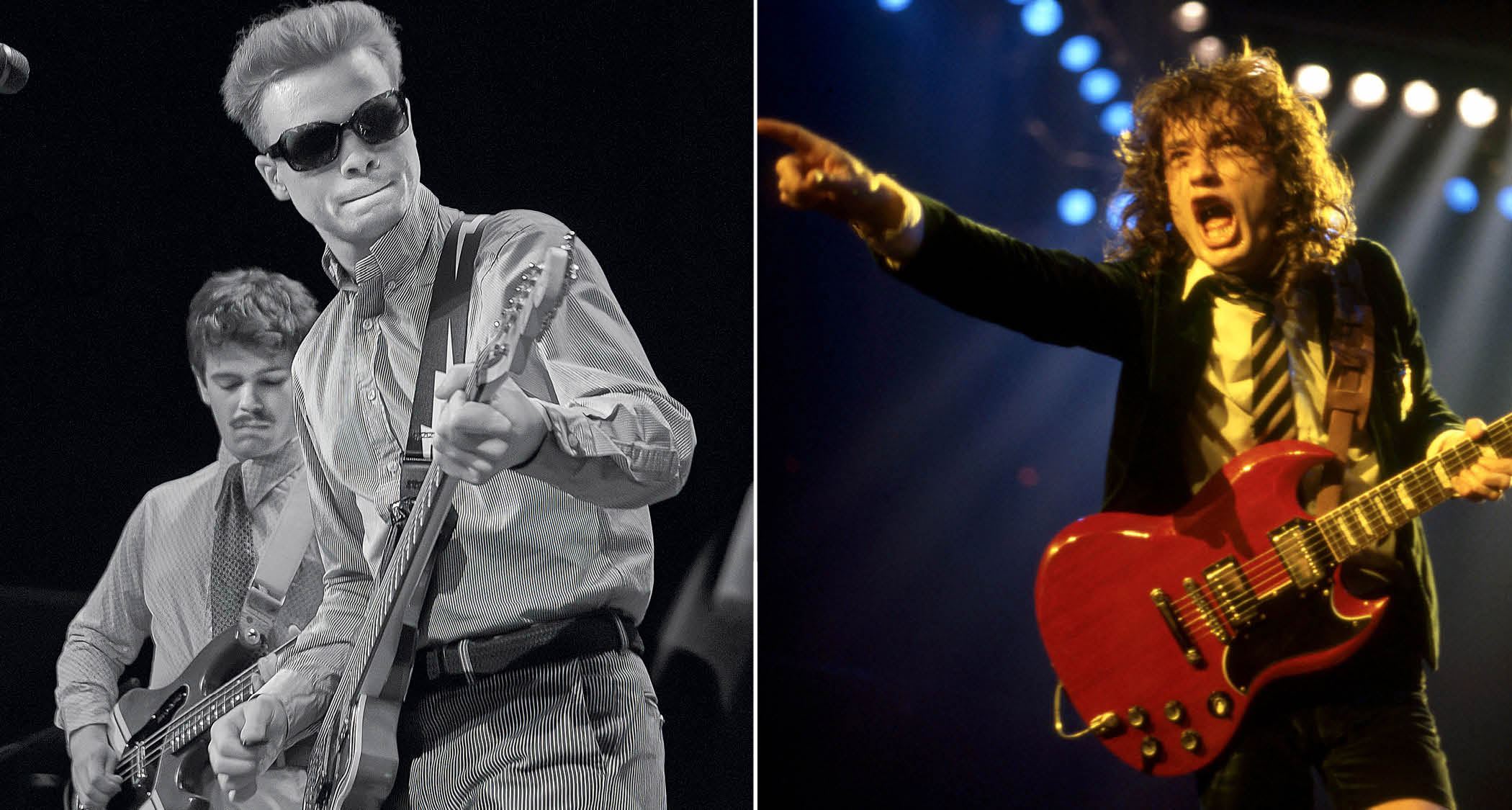
The jarring rhythms and unorthodox math rock brilliance of Black Midi is a world apart from the raw rock ’n’ roll of AC/DC, but as guitarist Geordie Greep tells Total Guitar, influence can take form in all kinds of ways…
Here, he explains what makes Angus Young a bona fide guitar hero who changed the sound of rock 'n' roll electric guitar.
I love Angus Young, but it doesn’t necessarily come across in my music…
“You might read this, listen to my band and think I’m talking gibberish, but there is definitely an influence! One thing that’s very prevalent in some of the best music is people taking influence from other things and imitating it in their own way. I guess if you played AC/DC to a hardcore Chuck Berry fan back in the day, they wouldn’t have liked it, mistaking it for noise.
“Sure, Angus is trying to play like Chuck Berry and old blues guitarists like that, but he doesn’t sound like them. It became his own thing. Look at Jimi Hendrix, he was playing his own version of the blues. But it didn’t come across like that at all; it sounded like something new.”
One thing I learned from AC/DC is how to get the most out of every song.
“They are masters of tension, knowing exactly when to extend something and take their time before moving on. That’s what gets you hyped up. They would jam out Jailbreak for 10 minutes, taking their time like a volcano about to erupt. And when it finally drops, it’s so satisfying and one of the best feelings. It’s about making the most out of that power.”
Angus manages to achieve so much with a simple approach.
“His solos usually have a similar kind of arc to them, using the same kind of vocabulary. But every time you hear one, he makes you listen. He never meanders – there’s always a very clear start, middle and climax.
“His leads never seem to trail off. There are lots of guitar players who are fantastic but they have a tendency to trail off… we all do, as guitarists! You’ll be in the middle of something and then let it get away from you. With Angus, that’s very rare.
His solos sound free, but they’re actually pretty choreographed. They’re like set pieces within a song
“He’s always on top of what he’s doing, what the song requires and how to make best use of the solo section. His solos sound free, but they’re actually pretty choreographed. They’re like set pieces within a song. The band will build up to sections completely reserved for the solo and work around him.
“A great example is the song What’s Next To The Moon, which has a brilliant solo. You can tell it’s a big feature because it doesn’t fit to eight or 16 bars or whatever. There’s a specific part they worked out which perfectly leads back into the verse, adding to the momentum.”
Angus changed the sound of an electric guitar
“Everyone was playing through the same equipment back in the ’70s, stuff like Marshall Plexis, but no-one sounded like him. There was so much attack and bite in his tone, but he kept the clarity.
“When people play AC/DC songs in a covers band or on YouTube, I notice they almost always use way too much distortion. But with AC/DC it’s not that overdriven; it’s just an amp being played really loud. The sound of the guitar that gets amplified, without all the mush or extra saturation.
Everything comes through clearly because it isn’t too distorted. You can hear all the chords and frequencies of each voicing
“Of course, AC/DC rely on simple chords, in a way that’s not too different to what Pete Townshend was doing. Everything comes through clearly because it isn’t too distorted. You can hear all the chords and frequencies of each voicing. That’s what helps make the music more nuanced than it could have sounded.
“Another thing I love about Angus is his use of the volume control, which is quite an underutilised thing in general. He taps into different levels of overdrive just through his guitar.
“He might keep it halfway up and reserve maximum power for his solos. And that’s why his solos always pop out… they’re never unsatisfying. That takes discipline – choosing to have a cleaner sound so he has the space to take it further when needed.”
Angus is mainly a blues player, but there are moments where he dabbles with classical ideas
“If you listen to Let There Be Rock from the If You Want Blood You’ve Got It live album, there’s one arpeggio he keeps repeating, getting faster and faster, almost like a faux neoclassical kind of thing. It’s something that many guitar players try to do, carving out their own solo section and risking pomposity.
“But with Angus it’s always good-natured and fun. It always sounds cool and gratifying. You never get the sense it’s too self-indulgent. I love Ritchie Blackmore as a player, but there are times where you can tell he’s taking himself a bit too seriously, sometimes he can start to lose his charm. With AC/DC, that doesn’t happen.
Angus often comes up with ideas like that which sounded tapped, though he uses his fretting hand against an open string
“Another favourite is Dirty Deeds Done Dirt Cheap, which has some more complicated ideas that go up almost in an Eddie Van Halen kind of way. It reminds me of the kind of things Steve Hackett from Genesis was doing in 1972. Angus often comes up with ideas like that which sounded tapped, though he uses his fretting hand against an open string.
“That’s quite a hard thing to control – if you’re using fingers to tap, it’s all roughly around the same volume level. Open strings, however, jump out a lot, but Angus can always control it.”
One thing that’s great about Gibson SGs is the access to the upper frets.
“Angus tends to make great use of that area. Almost every solo will involve ideas up to the 18th or 22nd fret. He’s in that range a lot. So if you’re hoping to sound more like him, that’s one thing you could do: start out lower and work your way up. He also knows not to play too much.
“He makes a feature out of every riff or lick, rather than noodling the whole time. He has a very disciplined way of going about himself, with not too much gain. If you get a Plexi-style amp, a guitar with humbuckers and maybe an EQ pedal for more bite, that will get you there.
“Me and Morgan [Simpson, Black MIDI drummer] used to do an AC/DC tribute just for fun. We only played a few shows but it was such a blast. All I had was a Boss EQ pedal for a push in the upper mids, and then I’d use my SG to control the volume. We got pretty close… there’s not much to it, gear-wise!”







